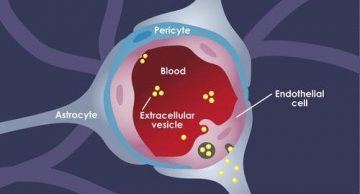From Phys.Org:
 Metastasizing breast cancers typically seek out the bones, lung, and brain. Brain metastases are especially dangerous; many women survive for less than a year after diagnosis. How is the cancer able to get past the blood brain barrier? And can it be blocked? Those questions led Ph.D. candidate Golnaz Morad, DDS, and her mentor Marsha Moses, Ph.D., to conduct an in-depth investigation of exosomes, also known as extracellular vesicles or EVs, and their role in breast-to-brain metastasis. Their surprising findings appear in the journal ACS Nano. “Golnaz was able to identify the mechanism by which EVs pass through the blood brain barrier and provide a ‘niche’ so that breast cancer cells can metastasize to brain,” says Moses, who directs the Vascular Biology Program at Boston Children’s Hospital and whose lab is interested in women’s cancers.
Metastasizing breast cancers typically seek out the bones, lung, and brain. Brain metastases are especially dangerous; many women survive for less than a year after diagnosis. How is the cancer able to get past the blood brain barrier? And can it be blocked? Those questions led Ph.D. candidate Golnaz Morad, DDS, and her mentor Marsha Moses, Ph.D., to conduct an in-depth investigation of exosomes, also known as extracellular vesicles or EVs, and their role in breast-to-brain metastasis. Their surprising findings appear in the journal ACS Nano. “Golnaz was able to identify the mechanism by which EVs pass through the blood brain barrier and provide a ‘niche’ so that breast cancer cells can metastasize to brain,” says Moses, who directs the Vascular Biology Program at Boston Children’s Hospital and whose lab is interested in women’s cancers.
Now that they know the mechanism, Moses and Morad hope to identify therapeutic targets that could stop brain metastases from happening. Simply put, EVs are tiny bubbles released by cells, encapsulating chemical messages they wish to convey. In the case of cancer cells, EVs carry factors that help create a more hospitable environment for both the primary tumor and its metastases, as Moses and Morad detailed recently in a review article. Primary tumors can secrete EVs into the circulation, allowing them to travel to distant organs and help spread the cancer.
More here.
